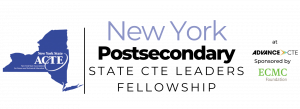In this third blog in the New York Postsecondary CTE In-State Fellowship series, Dr. Kevin R. Johnson Sr. shares his perspective on Advance CTE’s role in adapting the National Fellowship model and resources to better meet the needs of the New York In-State Fellowship. Dr. Johnson serves as a senior advisor at Advance CTE, National Fellowship lead, and New York In-State Fellowship coach.
 Current National Landscape of CTE Leadership
Current National Landscape of CTE Leadership
Over three dozen postsecondary Career Technical Education (CTE) leaders have participated in Advance CTE’s National Fellowship that strives to expand CTE leadership pipelines. Fellows continue to provide direct feedback on the need for continued support in building these pipelines (read more in blog one of this series), and the following data further emphasizes the need for increased development and training:
- As of 2017, only 16 states at the secondary level require CTE administrators to attain a certification or licensure.
- In the postsecondary space, the number of institutions of higher learning offering coursework specific to the administration and leadership of a CTE program has consistently declined.1
- Just nine states offer formal preparation programs for CTE administration.2
- In just four years, between the launch of Advance CTE’s National Fellowship in 2021 and June 2025, nearly 50% of states (24 of 50) have a new state director of CTE.
- In the last five years, state legislative bodies have ramped up their efforts to support workforce development and CTE through legislation that increases funding and eliminates administrative barriers between workforce agencies, secondary and postsecondary institutions, industry, and economic development entities across their state. The Advance CTE State Policies Impacting CTE 2024 Year In Review, highlights recent policy efforts across the nation.
- While state CTE agencies and CTE-affiliated organizations are increasingly offering administrative training for CTE through mentorship programs, contracted hybrid training modules, conference workshops, or training academies, the majority are focused on secondary leadership.
The combined lack of leadership training opportunities for aspiring postsecondary CTE leaders, the loss of institutional and agency knowledge due to high turnover, and the shift in policy mandates by state legislative and administrative bodies, resulting in increased interest in and demand for CTE, continuously highlight a need for leadership pipeline development.

The New York Experience at the Mid-Way Point
As we pause to reflect on the first half of the pilot In-State Fellowship, there have been multiple ways Advance CTE has adapted the National Fellowship design to better meet the needs of aspiring postsecondary CTE leaders in New York, such as:
- adjustments to the curriculum and workshop design to ensure state priorities were being addressed;
- outreach to state and national organizations to recruit advisory group members and begin the development of the postsecondary CTE ecosystem; and
- outreach to experienced postsecondary CTE leaders to recruit mentors; and
- recruitment of workshop presenters and panelists who could provide an expert state lens.
Workshop Design
The New York administrative team adopted most of the National Fellowship resources to include run-of-show and facilitation guides, workshop activities, and evidence-based resources. Advance CTE worked with the NY team to tailor the workshops and curriculum design to provide Fellows with a foundational knowledge of postsecondary CTE policies and practices for New York and a review of the subunits associated with postsecondary administration in the Carl D. Perkins Career and Technical Education Act (Perkins V).
Postsecondary CTE Ecosystem Development
At the launch of the In-State Fellowship, the need to create a postsecondary CTE ecosystem for technical and community colleges, regional workforce and secondary CTE centers with postsecondary offerings, secondary dual enrollment programs, and pathways in technology early college high schools (P-TECHs) was identified as a key element of success.
The Advance CTE team leveraged relationships developed through the administration of the National Fellowship to initiate a feedback and input process with organizations involved with postsecondary CTE efforts in New York. This recruitment and participation of local leaders to create the New York In-State Fellowship Advisory Committee was the initial step in developing the state’s postsecondary ecosystem.
Mentor Support
Integral to the Advance CTE Fellowship model are mentors who play a key role in leadership development and expanding the networks and social capital of the Fellows. The absence of a postsecondary ecosystem from the onset made mentor recruitment and mentor-Fellow matching a challenging task for the NY In-State team. Through the resources of the National Fellowship, Advance CTE provided access to a network of experienced postsecondary CTE leaders to supplement the state’s mentor pool. In-state Fellows who were interested in learning more about national policy and practices were connected to mentors and, by association, the mentor’s network, which allowed the NY Fellowship to best meet the needs of their Fellows.
Looking ahead to the second half of the NY Fellowship
The New York Fellowship continues to assist Fellows with the completion of real-world projects and providing feedback from administrators and mentors as the cumulative knowledge gained during the experience is applied to postsecondary CTE challenges in-state. Fellows will present their projects in September, with an anticipated transition for the third cohort from Fellows to alumni in November of 2025.
Through the pilot of the In-State Fellowship in New York, Advance CTE has been able to evaluate the effectiveness of the plug-and-play resources developed and designed from lessons learned from the National Fellowship. As a result, Advance CTE is planning to release an updated set of tools and resources in May of 2026 that will provide state CTE leaders with a blueprint for developing their own CTE leadership pipeline and ecosystem.
Interested in developing your own CTE leadership fellowship in your state? Please contact Dr. Kevin R. Johnson Sr. at [email protected].
This post is the third in a six-part blog series highlighting the New York Postsecondary State CTE Leaders Fellowship at Advance CTE sponsored by ECMCF (NY Fellowship). The series shares successes and challenges associated with the intentional creation of a postsecondary CTE ecosystem and leadership pipeline from both Advance CTE staff and the NYSACTE admin team’s point of view. The Postsecondary In-State Leaders Fellowship at Advance CTE provides CTE leaders with a framework by which to develop a CTE leadership pipeline to meet the needs of learners, industry, and education agencies and institutions.
- Zirkie, C. J., & Jeffrey, J. O. (2017). Career and technical education administration: Requirements, certification/licensure, and preparation. Career and Technical Education Research, 42(1), 21-33. https://doi.org/10.5328/cter42.1.21
- Ibid

